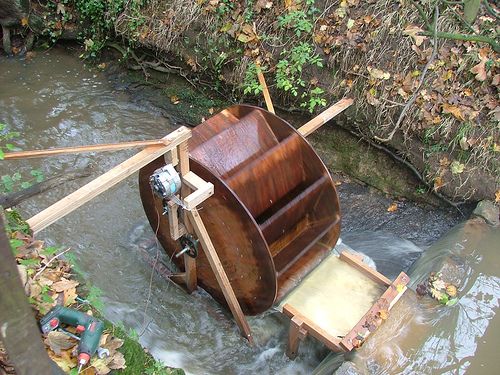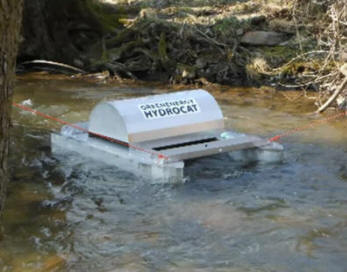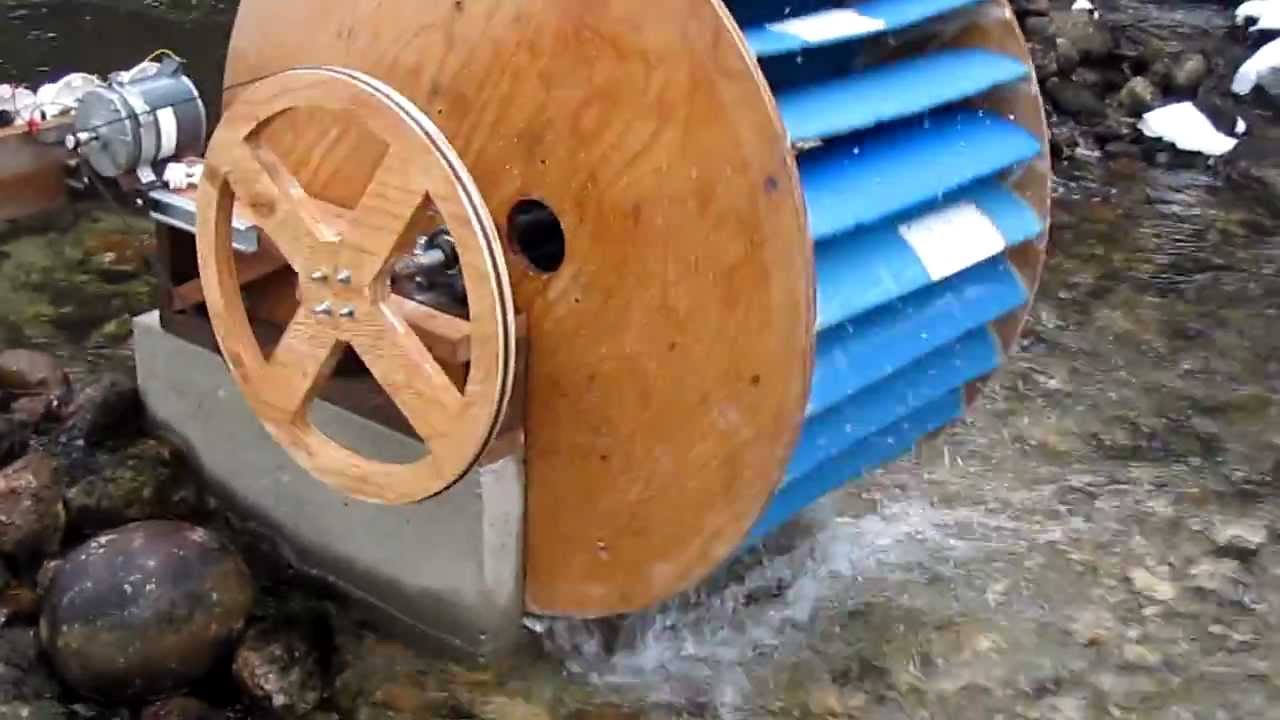I have a creek behind where I'm building my cabin about 10 ft. I was thinking a system to power smaller stuff using the movement of the creek any ideas on what to use building that.
You are using an out of date browser. It may not display this or other websites correctly.
You should upgrade or use an alternative browser.
You should upgrade or use an alternative browser.
Generater
- Thread starter Prepped123
- Start date

Help Support Homesteading & Country Living Forum:
This site may earn a commission from merchant affiliate
links, including eBay, Amazon, and others.
First off, I am not an electrician......but what the heck, I like to make sparks! I don't know if a small creek with create enough flow to turn some type of turbine to make electricity. You would be better off buying a commercially made solar or wind set up. Many smaller units can be purchased for under $700. Something to consider instead of putting a lot of money into something that may or may not work. Go with a proven working system.
I'm not an electrician either but I looked into this before; it won't work for me because the creek behind my place is flat, you need the creek to flow downhill for it to work, the steeper the grade the better. Check these out…
http://compare.ebay.com/like/190607923686?var=lv<yp=AllFixedPriceItemTypes&var=sbar
http://compare.ebay.com/like/190607923686?var=lv<yp=AllFixedPriceItemTypes&var=sbar
I like the idea, but not sure if you have a strong enough "current" to drive a wheel to power much of anything.I have a creek behind where I'm building my cabin about 10 ft. I was thinking a system to power smaller stuff using the movement of the creek any ideas on what to use building that.
For me I switched to Solar.
basically, a wheel with paddles and an axis attached to a medium gear which rotates a smaller gear attached to a small generator (about 1Kw). Generator is then attached to a battery. In my cousin's farm in the Visayas, we used a car alternator to generate 12V of power. This was turned by a stream nearby. We used this for lights at night and to power a small water pump to irrigate the fields. Problem we encountered with the alternator was when the flow wasn't strong enough, it wouldn't turn.
The size and width of the wheel and paddles are dependent on the depth and strength of flow of the stream.
The size and width of the wheel and paddles are dependent on the depth and strength of flow of the stream.
thats why i considered the paddle wheel instead of turbine..but in my case.the creek is a good distance off..and im not sure it'd be worth while for me to go with any thing when it comes to that..

$99.74
$140.99
Augason Farms 30-Day 1-Person Standard Emergency Food Supply Kit, Survival Food, Just Add Water, 200 Servings
Amazon.com

$24.99 ($6.25 / Count)
$26.99 ($6.75 / Count)
yarlung Set of 4 Kitchen Canisters with Airtight Lids, Coffee Tea Sugar Flour Tin Jars Nesting Food Storage Container Set for Farmhouse Decor, 4 Sizes
hedume

$19.99 ($6.66 / Count)
AuldHome Design Farmhouse Galvanized Canisters (Set of 3); Storage Containers for Coffee, Tea and Sugar in Galvanized Iron and Wood Design
ClockworkCornucopia

$15.99
$24.99
Relaxed Bible Study Guide plus Streaming Video: Letting Go of Self-Reliance and Trusting God
Amazon.com

$13.49
$26.99
7 Rules of Self-Reliance: How to Stay Low, Keep Moving, Invest in Yourself, and Own Your Future
Amazon.com

$7.99 ($2.00 / Count)
$12.99 ($3.25 / Count)
QIO CHUANG Emergency Mylar Thermal Blankets -Space Blanket Survival kit Camping Blanket (4-Pack). Perfect for Outdoors, Hiking, Survival, Bug Out Bag ,Marathons or First Aid 1
Qio chuang

$46.50 ($15.50 / Count)
$66.50 ($22.17 / Count)
Kito LIVING Canisters Sets for Kitchen Counter Storage and Organization with Wooden Bamboo Lids, Food Pantry Containers, Stackable Steel Storage Bins, Potato Storage Onion Keeper Garlic - Cream
Variety of Stores

$10.69
$16.99
allsun Electric Fence Voltage Tester Fault Finder Farming Equipment Portable Testing Tool Neon Lights Max 600V-7000 V
Global Meter

$39.95 ($13.32 / Count)
Red Co. Set of 3 Pre-Labeled Sugar, Coffee & Flour Distressed Metal Storage Canister Jars with Wooden Lids
Red Co Products (US Seller)

$69.06
$88.15
Primitives by Kathy Rustic Style Canisters, Set of 3, Galvanized Metal and Wood
Amazon.com
Thanks for all the great awnsers what about keeping a diesel gen. Quiet so it's unheard
If getting a generator, go diesel. For one, they last longer. Second, they can use a lot of different things for fuel, so you have the ability to improvise.
If you have good information on this please share. This is an area I need to research. I did have a 5k generator years ago. The generator part died from lack of use. At the time I did not know it needed to be used under a load. I now know it should be run for 10-15 minutes a month running equipment or the magnets in them die. The motor ran but the rest was junk. I want to get a new generator but am wondering the same thing. Any insight would be great!
I had to hold out on getting one this season, so on next season's list, but the diesel bit was consistently recommended (plus I have a diesel truck, so I know the reliability bit). It was recommended to me, to test it every month with a load (so you knew it would work when needed), even for just a few minutes, so that seems to reinforce what you experienced. Also, they recommended only really fueling it up a lot when you need it, not to let a lot of fuel just sit in it. This was from 3 different local farmers who use them (as well as my own research into it).
Jumping on this old thread.
I am looking at multiple energy possibilities and would like to have a combination of wind, solar and water as I don't like putting all my eggs in one basket. I have a small river running through the bottom of the garden and was also trying to work out how to get some energy from it. It is flat but the water moves quite quickly in the summer. Has anyone had any luck with undershot waterwheels? The old mills during the industrial revolution were able to power whole factories from the power of the water and they didn't have any way to store the energy they generated. I'm not aiming for that, just something to power a few lights in the evenings.
I am looking at multiple energy possibilities and would like to have a combination of wind, solar and water as I don't like putting all my eggs in one basket. I have a small river running through the bottom of the garden and was also trying to work out how to get some energy from it. It is flat but the water moves quite quickly in the summer. Has anyone had any luck with undershot waterwheels? The old mills during the industrial revolution were able to power whole factories from the power of the water and they didn't have any way to store the energy they generated. I'm not aiming for that, just something to power a few lights in the evenings.
I've always been a bit puzzled by this desire for post SHTF night lighting.
Probably the LAST thing you want to do is have a visible light at night, in a post SHTF scenario. It's like putting up a beacon, "Hey, I've got power and comfort here, ripe for the taking!"....
Granted, I want some lights available for emergencies, but other than the sentries watching the perimeter, most will likely be sleeping come sundown, and getting up at sunup, like the old days.
I do get the desire to diversify, but this comes at a cost, of having to implement all of these methods. Depending on how fast your water is flowing, this seems a pretty stable thing. (as of course, is solar), so the need to diversify really isn't all there. You'd want to be able to clock the speed of the flow, to then be able to do any kind of real power calculations, of what to expect from it.
Probably the LAST thing you want to do is have a visible light at night, in a post SHTF scenario. It's like putting up a beacon, "Hey, I've got power and comfort here, ripe for the taking!"....
Granted, I want some lights available for emergencies, but other than the sentries watching the perimeter, most will likely be sleeping come sundown, and getting up at sunup, like the old days.
I do get the desire to diversify, but this comes at a cost, of having to implement all of these methods. Depending on how fast your water is flowing, this seems a pretty stable thing. (as of course, is solar), so the need to diversify really isn't all there. You'd want to be able to clock the speed of the flow, to then be able to do any kind of real power calculations, of what to expect from it.
I've always been a bit puzzled by this desire for post SHTF night lighting.
Probably the LAST thing you want to do is have a visible light at night, in a post SHTF scenario. It's like putting up a beacon, "Hey, I've got power and comfort here, ripe for the taking!"....
Granted, I want some lights available for emergencies, but other than the sentries watching the perimeter, most will likely be sleeping come sundown, and getting up at sunup, like the old days.
I do get the desire to diversify, but this comes at a cost, of having to implement all of these methods. Depending on how fast your water is flowing, this seems a pretty stable thing. (as of course, is solar), so the need to diversify really isn't all there. You'd want to be able to clock the speed of the flow, to then be able to do any kind of real power calculations, of what to expect from it.
If it’s a small creek then the most you will hope for is to run a car alternator to charge batteries with. The problem is the distance. DC has problems with distance, so if your creek is close to the house, and batteries, then it is doable. If your handy mechanically and can scavenge materials you could set something up cheap. Solar panels have come down alot too and can be had for as little as 1.00 a Watt.
- Joined
- Sep 7, 2013
- Messages
- 18,694
Probably best to have a generator house right where the water wheel is, store the electricity in batteries there and invert to 110 to run to the house. Then you will have power that is on-demand and any excess just goes into charging the batteries. Line losses at 12 volts will be significant.
Or even better, get a split phase inverter and run 220 to the house which will have less line loss than 110.
Or even better, get a split phase inverter and run 220 to the house which will have less line loss than 110.
These guys failed... http://hydro-electric-barrel.com/html/news.html
These guys made something work, but boiling batteries would freak me right out...http://www.backwoodshome.com/a-small-creek-provides-plenty-of-power-for-this-off-grid-home/
Some DIY images, not sure what the power output would be...



If I had a creek, I would dam it up, and give it a shot!
These guys made something work, but boiling batteries would freak me right out...http://www.backwoodshome.com/a-small-creek-provides-plenty-of-power-for-this-off-grid-home/
Some DIY images, not sure what the power output would be...



If I had a creek, I would dam it up, and give it a shot!
Most call it a ram pump. Pretty simple device, and great for off grid use. It works on elevation drop of the water. It won’t work on fairly level waterways though.A bit off topic, but the flow of the creek can actually be used to pump water uphill (slowly) without electricity. The clacker i think its called, due to the sound it makes..







































